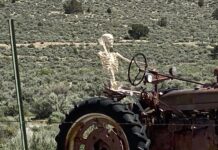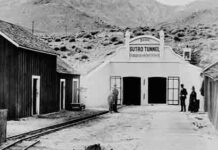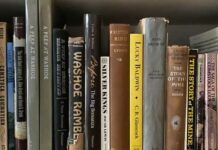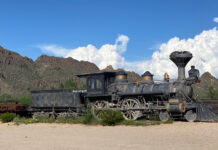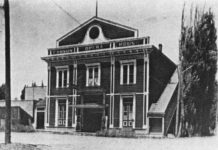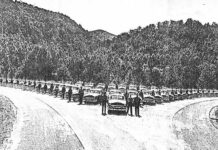The Funeral Oration for Riley Grannan
by Herman W. Knickerbocker
On April 3, 1908, a former Methodist minister faced a small audience crowded into a backroom dance hall in the booming mining town of Rawhide.
His name was Herman Knickerbocker, and he had been the pastor of Trinity Church in Los Angeles until he was tried for heresy for his unconventional religious views. Acquitted, he nevertheless abandoned his church career and joined the rush to the gold and silver camps then booming in the southern Nevada desert.
This preacher-turned-prospector tried his hand at numerous jobs during his Nevada years, from pick and shovel mining to theatricals and Shakespearean readings. By 1908 he had followed the tide of fortune to Rawhide, as had thousands of others, including an eastern gambler and sporting man named Riley Grannan.
Grannan was famous throughout the country for the size of his bets and the strength of his nerve. In the winter of 1908 he was tapped out broke in San Francisco. Bankrolled by some friends, he went to Goldfield and then to Rawhide, where he bought a saloon and gambling house called Moss’s Corner.
He died in April of pneumonia. According to racetrack historian Kevin Martin, his last words were “It’s all a joke; it doesn’t amount to anything.” Before his corpse was loaded into the back of an open Pope-Toledo for the long drive to the railroad at Schurz, the coffin was carried into the back of the saloon for a brief memorial service. Herman Knickerbocker came in from his prospect hole to deliver the eulogy.
Recognizing his way with words, Rawhide’s promoters arranged for a shorthand stenographer to capture them on the fly. The eulogy was transcribed and sent to newspapers around the USA. It endures as a small treasure of Nevada literature.
— David W. Toll, Gold Hill, Nevada
![]()
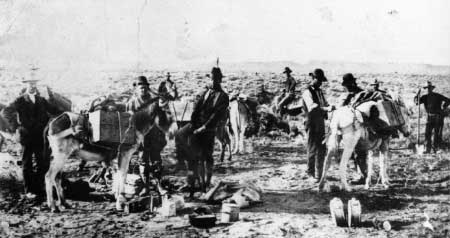
I feel that it is incumbent upon me to state that in standing here I occupy no ministerial or prelatic position. I am simply a prospector. I make no claims whatever to moral merit or to religion except the religion of humanity, the brotherhood or man. I stand among you today simply as a man among men, feeling that I can shake hands and say “brother” to the vilest man or woman that ever lived. If there should come to you anything of moral admonition through what I may say, it comes not from any sense of moral superiority, but from the depth of my experience.
Riley Grannan was born in Paris, Kentucky, about 40 years ago. I suppose he dreamed all the dreams of boyhood. They blossomed into phenomenal success along financial lines at times during his life. I am told that from the position of a bell boy in a hotel he rose rapidly to be a celebrity of world-wide fame. He was one of the greatest plungers, probably, that the continent has ever produced.
He died day before yesterday in Rawhide.
This is a very brief statement. You have the birth and the period of the grave. Who can fill the interim? Who can speak of his hopes and fears? Who can solve the mystery of his quiet hours that only himself know? I cannot.
He was born in the sunny Southland, in Kentucky. He died in Rawhide.
Here is the beginning and the end. I wonder if we can see in this a picture of what Ingersoll said at the grave of his brother– “Whether it be near the shore or in mid-ocean or among the breakers, at the last a wreck must mark the end of one and all.”
![]() He was born in the sunny Southland, where brooks and rivers run musically through the luxuriant soil; where the magnolia grandiflora like white stars grow in a firmament of green; where crystal lakes dot the greensward and the softest summer breezes dimple the wave-lips into kisses for the lilies on the shore; where the air is resonant with the warbled melody of a thousand sweet-voiced birds and redolent of the perfume of many flowers. This was the beginning. He died in Rawhide, where in the winter the shoulders of the mountains are wrapped in garments of ice and in summer the blistering rays of the sun beat down upon the skeleton ribs of the desert. Is this a picture of universal human life?
He was born in the sunny Southland, where brooks and rivers run musically through the luxuriant soil; where the magnolia grandiflora like white stars grow in a firmament of green; where crystal lakes dot the greensward and the softest summer breezes dimple the wave-lips into kisses for the lilies on the shore; where the air is resonant with the warbled melody of a thousand sweet-voiced birds and redolent of the perfume of many flowers. This was the beginning. He died in Rawhide, where in the winter the shoulders of the mountains are wrapped in garments of ice and in summer the blistering rays of the sun beat down upon the skeleton ribs of the desert. Is this a picture of universal human life?
Sometimes when I look over the circumstances of human life, a curse rises to my lips, and, if you will allow me, I will say here that I speak from an individual point of view. I cannot express other than my own views. If I run counter to yours, at least give me credit for a desire to be honest.
When I see the ambitions of man defeated; when I see him struggling with mind and body in the only legitimate prayer he can make to accomplish some end; when I see his aim and purpose frustrated by a fortuitous combination of circumstances over which he has no control; when I see the outstretched hand, just about to grasp the flag of victory, take instead the emblem of defeat, I ask: What is life? Dreams, awakening and death; “a pendulum ‘twixt a smile and a tear”; “a momentary halt within the waste and then the nothing we set out from”; “a walking shadow, a poor player that struts and frets his hour upon the stage and then is heard no more”; “a tale told by an idiot, full of sound and fury, signifying nothing”; a child-blown bubble that but reflects the light and shadow of its environment and is gone; a mockery, a sham, a lie, a fool’s vision; its happiness but Dead Sea apples; its pain the crunching of a tyrant’s heel. I feel as Omar did when he wrote:
We are no other than a moving row
Of magic Shadow-shapes that come and go
Round with the Sun-illumined lantern held
In the midnight by the Master of the show.
But helpless pieces of the game He plays
Upon the checker-board of nights and days
And one by one back in the closet lays.
The ball no question makes of Ayes and Noes,
But here and there as strikes the player goes;
And He that tossed you down into the field—
He knows about it all — He knows — He knows.
But I don’t. This is my mood.
![]()
Not so with Riley Grannan. If I have gauged his character correctly, he accepted the circumstances surrounding him as the mystic officials to whom the universe had delegated its whole office concerning him. He seemed to accept both defeat and victory with equanimity. He was a man whose exterior was placid and gentle as I have ever seen, and yet, when we look back over his meteoric past we can readily understand, if this statement be true, that he was absolutely invincible in spirit. If you will allow me, I will use a phrase most of you are acquainted with. He was a “dead game sport.” I say it not irreverently, but fill the phrase as full of practical human philosophy as it will hold and I believe that when you say one is a “dead game sport” you have reached the climax of human philosophy.
I believe that Riley Grannan’s life fully exemplified the philosophy of these verses:
It’s easy enough to be happy
When life flows along like a song;’
But the man worth while
Is the man who will smile
When everything goes dead wrong.
For the test of the heart is trouble,
And it always comes with the years.
And the smile that is worth
The homage of earth
Is the smile that shines through tears.
I know that there are those who will condemn him. There are those who believe today that he is reaping the reward of a misspent life. There are those who are dominated by medieval creeds. To those I have no words to say in regard to him. They are ruled by the skeleton hand of the past and fail to see the moral beauty of a character lived outside their puritanical ideas. His goodness was not of that type, but of the type that finds expression in a word of cheer to a discouraged brother; the type that finds expression in friendship, the sweetest flower that blooms along the dusty highway of life; the type that finds expression in manhood.
He lived in the world of sport. I do not mince my words. I am telling what I believe to be true. In the world of sport — hilarity sometimes, and maybe worse — he left the impress of his character on this world, and through the medium of his financial power he was able with his money to brighten the lives of its inhabitants. He wasted it so the world says. But did it ever occur to you that the most sinful men and women who live in this world are still men and women? Did it ever occur to you that the men and women who inhabit the nightworld are still men and women? A little happiness brought into their lives means as much to them as happiness brought into the lives of the straight and good. If you can take one ray of sunlight into their night-life and thereby bring them one single hour of happiness, I believe you are a benefactor.
Riley Grannan may have “wasted” some of his money this way.
![]()
Did you ever stop and think how God does not put all his sunbeams into corn, potatoes and flour? Did you ever notice the prodigality with which He scatters these sunbeams over the universe? Contemplate:
God flings the auroral beauties ’round the cold shoulders of the north; hands the quivering picture of the mirage above the palpitating heart of the desert; scatters the sunbeams like lamellated gold upon the bosoms of myriad lakes that gem the verdant robe of nature; spangles the canopy of night with star-jewels and silvers the world with the reflected beams from Cynthia’s mellow face; hangs the gorgeous crimson curtain of the occident across the sleeping-room of the sun; wakes the coy maid of dawn to step timidly from her boudoir to climb the steps of the orient and fling wide-open the gates of the morning. Then, tripping o’er the landscape, kissing the flowers in her flight, she wakes the birds to herald with their music the coming of her King, who floods the world with refulgent gold. Wasted sunbeams, these? I say to you that the man who by the use of his money or power is able to smooth one wrinkle from the brow of care, is able to change one moan or sob into a song, is able to wipe away one tear and in its place put a jewel of joy–this man is a public benefactor.
I believe that some of Riley Grannan’s money was “wasted” in this way.
![]()
We stand at last in the presence of the Great Mystery. I know nothing about it, nor do you. We may have our hopes, but no knowledge. I do not know whether there be a future life or not; I do not say there is not. I simply say I do not know. I have watched the wicket-gate closed behind many and many a pilgrim. No word has come back to me. The gate is closed. Across the chasm is the gloomy cloud of death. I say I do not know. And, if you will allow this expression, I do not know whether it is best that my dust or his at last should go to feed the roots of the
grasses, the sagebrush or the flowers, to be blown in protein forms by the law of the persistency of force, or whether it is best that I continue in personal identity beyond what we call death. If this be all, “after life’s fitful fever, he sleeps well . . . nothing can harm him further.” God knows what is best.
This may be infidelity, but if it is, I would like to know what faith means. I came into this universe without my volition — came and found a loving mother’s arms to receive me. I had nothing to do with the preparation for my reception here. I have no power to change the environment of the future, but the same power which prepared the living arms of a mother to receive me here will make proper reception for me there. God knows better than I what is good for me, and I leave it with God.
If I had the power today by the simple turning of my hand to endow myself with personal immortality, in my infinite ignorance I would refuse to turn my hand. God knows best. It may be that there is a future life. I know that sometimes I get very tired of this life. Hedged and crippled, caged like a bird caught from the wilds, that in its mad desire for freedom beats its wings against the bars only to fall back in defeat upon the floor — I long for death, if it will but break the bars that hold me captive.
![]()
I was snowbound in the mountains once for three days. On account of the snow we had to remain immediately alongside the train. After three days of this, when our food had been exhausted, the whistle blew that meant the starting of the train out into the world again. It may be that death is but the signal whistle that marks the movement of the train out into the broader stretches of spiritual being.
As we stand in the presence of death, we have no knowledge, but always, no matter how dark,the gloomy clouds hang before me, there gleams the star of hope. Let us hope, then, that it may be the morning star of eternal day. It is dawning somewhere all the time. Did you ever pause to think that this old world of ours is constantly swinging into the dawn? Down the grooves of time, flung by the hand of God, with every revolution it is dawning somewhere all the time. Let this be an illustration of our hope. Let us believe, then, that in the development of the human soul, as it swings forward toward its destiny, it is constantly swinging nearer and nearer to the sun.
And now the time has come to say good-bye. The word “farewell” is the saddest in our language. And yet there are sentiments sometimes that refuse to be confined in that word. I will say “Good-bye, old man.” We will try to exemplify the spirit manifested in your life in bearing the grief at your parting. Words fail me here. Let these flowers, Riley, with their petaled lips and perfumed breath, speak in beauty and fragrance the sentiments that are too tender for words.
Good-bye.
![]()



